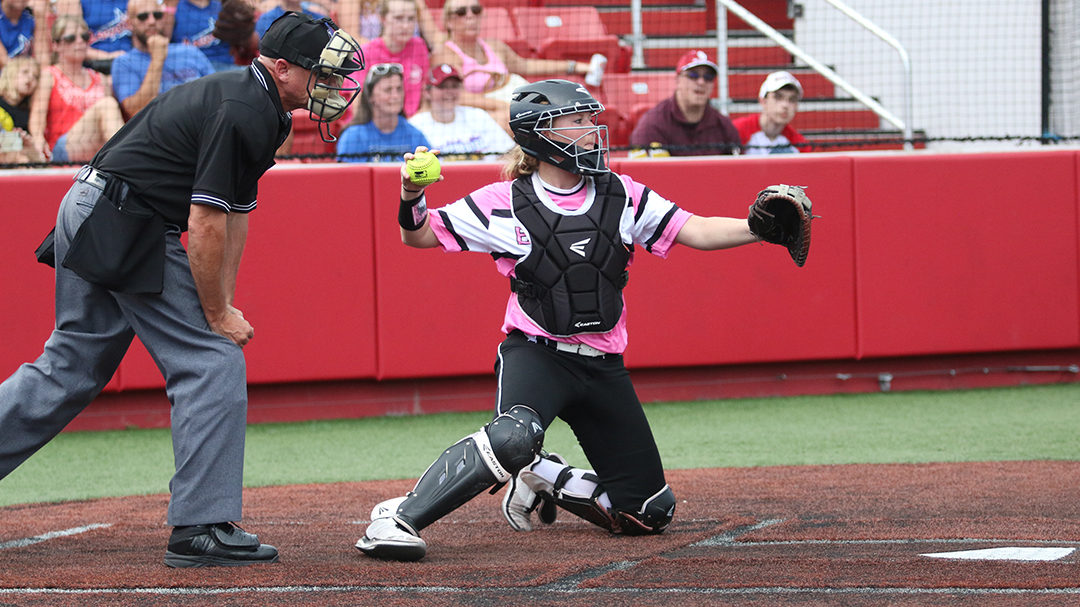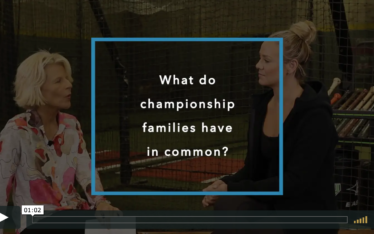Dr. Tim Elmore: Competition. Is It Good For You?
Competition is a big part of sports, and a big topic of conversation among those who talk about youth sports. How competitive is too competitive? How can we take the pressure off young athletes and “just let them have fun”? Should fun be the goal?
ONE Softball has spoken with hundreds of college coaches and most say that kids are not used to competing as much as prior generations, and that they really struggle with bouncing back from failure. This resilience characteristic is one we know is important for everyone. Read Dr. Elmore’s take on making competition a healthy part of a child’s life.

Photo Credit Dina Kwit, NPF
This year, I have watched countless ballgames, athletic contests, and competitions among young athletes. In several of them, I have watched people (either the players, the coaches, or the parents) show evidence of an unhealthy competitive spirit. You already know what I am talking about, don’t you?
- It’s the dad who cusses out his 12-year old son, because his boy struck out and embarrassed him. Dad sends him to the dugout humiliated.
- It’s the athlete who can’t even shake an opponents hand after a loss, because he can’t manage his emotions, and forgets it’s a game. Poor sportsmanship.
- It’s the coach who screams, without restraint, at a relatively minor infraction by a kid who’s barely old enough to shave.
It is easy, after such experiences, to conclude that a competitive spirit is just plain unhealthy. Some even write about this, saying humans were never meant to act in competition with one another, but in collaboration with one another.
But this conclusion fails to see the research. All competition is not unhealthy.
I just read about two intriguing experiments that were performed in Europe. One was with a group of adults who jumped out of an airplane three times one afternoon, for the first time. This experimental group had gauze put in their mouths (just before each jump) to assess their level of anxiety from the chemicals in their saliva. Predictably, the jumpers experienced a huge amount of angst on their first jump, and then less and less with each succeeding jump.
The second experiment involved seasoned ballroom dancers. These were men and women who’d danced competitively hundreds of times over decades. Interestingly, when gauze was put in their mouths just before each dance contest, experimenters discovered that these veteran dancers experienced about the same amount of angst or nervousness as did people jumping from an airplane. It didn’t make sense—those who jumped were leaping from an airplane for the first time, while the dancers had been doing the waltz or the fox trot for decades. Dancing is much safer than skydiving, don’t you think? Why the heightened adrenaline?
The answer is competition.
The dancers, while very experienced, were competing with each other. That’s it.
It was discovered that whenever people are watched, evaluated, or know they are performing alongside someone else, they tend to perform better. Our senses are raised. We are alert. We are more aware of who we are and what we’re doing. In short, we tend to be at our best.
It Can Actually Be Good for Us
The Latin root for the word “competition” invites us to reframe our typical stereotype. It means striving together (com-pete) with others in the pursuit of best solutions for the common good. This means that because we’re measuring each person’s performance against others, it raises the standard for all. Do you remember Dick Fosbury in the 1968 Olympics in Mexico City? His method for the high jump was laughed at, but he won the gold medal. Now, his “Fosbury Flop” is the standard for all high jumpers. The competition made everyone who followed better. Consider this. In the 2012 Olympic men’s swimming relay, five of the eight teams finished ahead of the world record! Each leg of the race, swimmers were so aware of how close they were to the one in the lane next to them, it pushed them to swim faster. In short, swimming against the best of the best raised the bar for every athlete. Apparently, the Greeks got it right centuries ago. The point of competing is that it makes everyone better since we are watching and evaluating our performance.
I remember running track in Junior High school. My friend Tom and I were doing a mile run in practice one day, when coming around the west side of the track, we noticed the cheerleaders were practicing as well. They were beautiful. As we passed them by, you should have seen us suck in our stomachs, speed up our pace, and improve our form. We looked our best when running in front of those girls. Why?
I always do better when I am watched.
The Big Picture
What if we talked to our young athletes about this big picture? You probably have some very competitive members on your team already, but knowing the point of competition gives us perspective. Suddenly, it is not only about being better than the person who competes against you, but being better than you’ve ever been before. The standard goes up. That’s all we can ask for, as a coach.
The research I’ve enjoyed reading about has encouraged us at Growing Leaders to place our Habitudes® images on a gaming platform. We’ve literally “gamified” the life and leadership principles we teach. So now, in addition to learning cool truths with an image, students get to compete and collaborate, scoring points, discussing how they can apply the content, uploading ideas, and earning badges along the way. It is digital. It is interactive. It is image rich. It is short. And it is fun.
We call it HabitudesPlay. Check it out here to see: HABITUDESPLAY.
Q: How could you leverage competition in a healthy way to build better people?

Republished with permission from GrowingLeaders.com




About The Author
Dr Tim Elmore
Dr. Tim Elmore is the founder and president of Growing Leaders, a non-profit created to develop emerging leaders. Elmore trains middle school, high school and college students with the skills they need to become authentic leaders with huge potential to transform society.